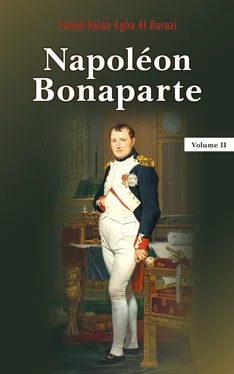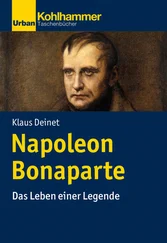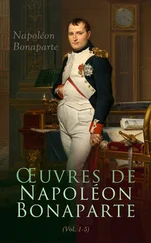Fahed Aslan Agha Al Barazi - Napoléon Bonaparte
Здесь есть возможность читать онлайн «Fahed Aslan Agha Al Barazi - Napoléon Bonaparte» — ознакомительный отрывок электронной книги совершенно бесплатно, а после прочтения отрывка купить полную версию. В некоторых случаях можно слушать аудио, скачать через торрент в формате fb2 и присутствует краткое содержание. Жанр: unrecognised, на английском языке. Описание произведения, (предисловие) а так же отзывы посетителей доступны на портале библиотеки ЛибКат.
- Название:Napoléon Bonaparte
- Автор:
- Жанр:
- Год:неизвестен
- ISBN:нет данных
- Рейтинг книги:4 / 5. Голосов: 1
-
Избранное:Добавить в избранное
- Отзывы:
-
Ваша оценка:
- 80
- 1
- 2
- 3
- 4
- 5
Napoléon Bonaparte: краткое содержание, описание и аннотация
Предлагаем к чтению аннотацию, описание, краткое содержание или предисловие (зависит от того, что написал сам автор книги «Napoléon Bonaparte»). Если вы не нашли необходимую информацию о книге — напишите в комментариях, мы постараемся отыскать её.
Napoléon Bonaparte — читать онлайн ознакомительный отрывок
Ниже представлен текст книги, разбитый по страницам. Система сохранения места последней прочитанной страницы, позволяет с удобством читать онлайн бесплатно книгу «Napoléon Bonaparte», без необходимости каждый раз заново искать на чём Вы остановились. Поставьте закладку, и сможете в любой момент перейти на страницу, на которой закончили чтение.
Интервал:
Закладка:
Napoléon never lost his forbearance with his brother Louis, for he knew that he was dogged by ill health. To their anxious mother he wrote: “You need not worry; Louis’ conduct can only be explained due to his illness. Your very caring son, Napoléon.”
Jérôme, Napoléon’s youngest brother, King of Westphalia, had also broken the ‘Continental System’, openly permitting the sale and transhipment of English industrial and colonial goods. He lavished gifts on his mistresses and happily spent his time gallivanting about. And like his brother Louis, who had become more Dutch than the Dutch themselves, he became more Germanic than French; and although Jérôme was quite a controversial character and frequent embarrassment to Napoléon, he paradoxically kept a heterogeneous professional army comprising of Catholics, Lutherans, Calvinists and even Jews. His lavish spending and extravagant way of life left his little kingdom swimming in debt, prompting Napoléon to write reprimanding him: “To be in debt as you are is an infamy! Sell your horses, your jewels and your assets and close your debts. A man in debt is a man who pawns his future to the enemy!”
As for his brother Joseph, King of Spain, the situation hardly looked any better. In 1810, with an army of a quarter million men, the cost of wages and upkeep had soured to 300 million Francs. In later years, prior to French withdrawal from the Peninsula, this cost would practically triple to offset the staggering sum of expenditure, Napoléon authorised confiscation and sale of church properties, and properties of those caught in opposition to the French occupations.
Joseph was a good man, but hardly of a reliable calibre to administer and run a kingdom embroiled in such turmoil as Spain; yet Napoléon needed him, at least in part. He therefore had decided that the best solution was to divide Spain into military districts, each headed by one of his marshals, who were directly responsible to the Emperor. This resulted in depriving Joseph of Burgos, Navarre, Aragon, Catalonia, Biscay and Valladolid, leaving him to administer Castille, including the capital, Madrid. This administrative change had angered King Joseph, who pretested it in no uncertain terms, prompting Napoléon to respond: “Joseph, being the primogenitor, still believes he has pretentions as head of the family. How absurd?!” Joseph, believing that his redemption lays in becoming more Spanish oriented than French, like his brother Louis and Jérôme to the Dutch and Germans, embarks on a process of replacing his French officers by Spaniards. General Sebastiani was angered by the sarcasm allowed at the emperor in Joseph’s court reports to Napoléon: “The Emperor has been sardonically vilified at court by members of the king’s retinue.”
Napoléon’s saddest chapter in Spain was his own brother Joseph. Many questions can be asked; why make Joseph king of Spain? He knew his brother was quite limited, Las Casas, who accompanied Napoléon to St. Helena, wrote in his memoirs, quoting Napoléon: “Joseph is the most incapable man I had chosen for Spain.” In a conversation with War Minister Clarke, he tells him, “Joseph is not only incapable of command, but is unaware of his own limitation.” So why didn’t Napoléon replace his older brother and put a more capable commander like Marshal Berthier or Soult in place? The answer is simple; the crowns of the empire must remain in the house of Bonaparte. Even when he dethrones his brother Louis, King of Holland, he makes no replacement; he simply annexes that country.
The atrocities in Spain afflicted all combatants. As one British soldier from the 71st put it, “It was bitterly cold, there was no fuel, no shelter, snow the only means to drink; misery without a glimpse of comfort. Demoralisation was setting in at the village of Bembire, hundreds of troops left the ranks, burning and plundering, they fought their way into win vaults.” A British officer adds, “Bembire was stormed and pillaged; doors and windows were broken, locks and fastenings forced open; rivers of wine ran through the houses and into the streets, where entire families with their children ran away helplessly. The streets were filled with revellers who were cut down mercilessly by the French Cavalry who were hard on their heels avenging Benavente.”
Napoléon, who had watched the events of Benavente from an eminence, wrote, after dislodging them, on December 29, 1808: “The English are running away as fast as they can. Have all this printed in the newspaper and have them translated into German and Italian and circulated in both countries.” It was the night that the Emperor handed over the command of the army to Marshal Soult and ordered the immediate return of the Imperial Guard to Valladolid.
The withdrawal of General Moore was related in an earlier chapter, but it is noteworthy to add that at Lugo on January 6, 1809, Moore had halted his army and prepared for battle. “The men bivouacked on an icy ridge without shelter and scarcely any food. But the pursuing French did not attack; with the last provisions exhausted the retreat was resumed in a terrible night of sleet and hail as the troops, demoralised and suffering from hunger, marched on”.
Of course, the British put all the blame of Moore’s reverses on the Spaniards, but Walter Scott wrote: “England wanted everything but courage and virtue in her struggle against genius. Skill, knowledge of mankind, ineffable, unhesitating villainy, combinations of maneuvers and means are with our adversary. We can only fight like mastiffs, blindly and desperately.”
In fact, Moore’s death had saved him from official censure, but many laid the suffering of the troops at his door, blaming his inactivity and precipitate retreat. But Moore’s saving of his army from an imminent debacle was unperceived; at best it seemed to the detractors that he had finally got his army or what was left of it safely shipped back to England, before being struck himself by a cannon ball and dying in the process.
While Spain was in turmoil, Napoléon was on war footing with Austria. Under the direction of the Archdukes Charles and Karl, the ablest of commanders in central Europe, Austria’s arsenals were being replenished, her artillery re-horsed and her polyglot heterogeneous army reorganized in corps d’arme in the Napoléonic Model. Napoléon’s remonstrances were put in place by diversionary answer by the Austrian Minister Count Stadion, while Emperor Francis with Archduke Charles patiently prepared for war. With the Spanish Bourbon’s fall, Austria’s remaining option was to turn to England, and as a result secret negotiations opened between the two powers. However, England’s premature allusion to this event had Napoléon scurrying back from Spain to Paris. Details of these events can be found in an earlier chapter.
Napoléon’s predicament in Spain was an inseparable cause of his future failures and ultimate disaster, for he had no less than 250,000 to 300,000 men tied up in the Spanish quagmire, soldiers that he desperately needed on the Western and Eastern fronts leading to the Russian campaign of 1812. To make things ever worse for Napoléon, he learned that Sir Arthur Wellesley had left Portmouth on April 15th and was on his way to Portugal. When he was warned that his ship was in danger of foundering, he retorted “Oh, in that case, I shall not remove my boots.”
By April 22 1809, on Wellesley’s landing at Lisbon, the combined British force had numbered around 40,000 men. 12,000 British, 3,000 Hanoverians of the King’s German legion and 16,000 Portuguese regulars. One-hundred-and-sixty miles north of Lisbon, Soult was approaching with 23,000 veterans, while Victor, with a force of 25,000 men, had routed the Spaniards at Medellín and was now threatening Lisbon from the East. Between them lay General Lippisse, with another 6,000 men near Ciudad Rodrigo. Some 200,000 French troops were scattered about the Peninsula, some in garrisons, others on field duty. The skirmishes that ensued between Wellesley and Soult culminated in Soult’s retreat and lifting the threat on Lisbon. After nine days of suffering over perilous mountains and the loss of their baggage train, they reached Galicia. By May 19, Soult had lost a quarter of his men, either perishing on the way or fallen victims at the hands of Spanish resistance. A British commissary saw French soldiers nailed alive to the doors of barns, others trussed and emasculated with their amputated members stuffed into their mouths.
Читать дальшеИнтервал:
Закладка:
Похожие книги на «Napoléon Bonaparte»
Представляем Вашему вниманию похожие книги на «Napoléon Bonaparte» списком для выбора. Мы отобрали схожую по названию и смыслу литературу в надежде предоставить читателям больше вариантов отыскать новые, интересные, ещё непрочитанные произведения.
Обсуждение, отзывы о книге «Napoléon Bonaparte» и просто собственные мнения читателей. Оставьте ваши комментарии, напишите, что Вы думаете о произведении, его смысле или главных героях. Укажите что конкретно понравилось, а что нет, и почему Вы так считаете.












